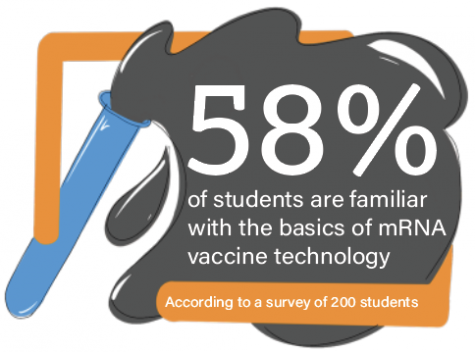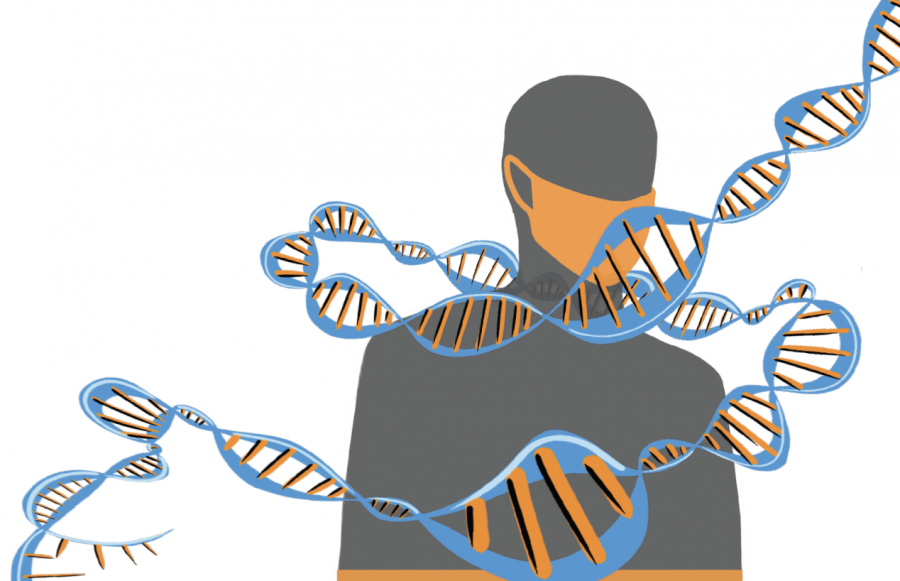On Dec. 11, 2020, Pfizer received emergency authorization from the Food and Drug Administration (FDA) to begin distribution of its COVID-19 vaccine. Moderna’s vaccine followed suit a week later
Phase I: The Development
Analyzing the timeline and technologies behind America’s COVID-19 vaccines
On Dec. 11, 2020, Pfizer received emergency authorization from the Food and Drug Administration (FDA) to begin distribution of its COVID-19 vaccine. Moderna’s vaccine followed suit a week later. Despite being the first to use mRNA technology, as opposed to traditional methods, both COVID-19 vaccines have been ready for deployment on limited populations in record time — less than a year after COVID-19 was first contracted outside of China in January of 2020.
MVHS alumna Dongjia Chen ‘09, a pharmacist for Sharp HealthCare, was among the first to receive the vaccine near the end of December. She was impressed by the FDA’s approval speed and how quickly it was developed by researchers.
Senior Janya Budaraju believes one reason for the vaccine’s speedy arrival was the unprecedented levels of funding and resources that the researchers obtained.
“Of course it’s scary to hear that it took six months when normally it takes years,” Budaraju said. “I see why people may be concerned, but … since the beginning of the pandemic, I’ve been trusting healthcare professionals [and] doctors to give us the information that they know.”
Traditional vaccines use “weakened version[s]” of the real virus to incite an immune response in a patient’s body, producing antibodies that then fight the pathogen, according to AP Biology teacher Renee Fallon. China’s Sinopharm COVID-19 vaccine uses this method.
But producing these vaccines often takes months. On the other hand, producing the Pfizer or Moderna vaccines, which instead generate the virus’s RNA sequence — the instructions to make the virus — takes only one week. This RNA sequence is then injected into the cells, prompting the production of COVID-19 antigens, molecules that trigger the immune system to produce antibodies that fight the pathogen.
“Since [the RNA codes for] a foreign protein, your immune system will then develop an attack against [the virus’s protein],” Fallon said. “But since it’s not actually the virus, it can’t make you sick. Your more powerful immune system really needs a practice call to learn about a specific enemy. So by making these proteins, your body learns about this specific enemy, and as a result, if that enemy attempts to attack you, your immune system stomps all over it before it makes you sick.”
Though Pfizer and Moderna both use RNA technology, these vaccines have their differences. For example, patients taking the Pfizer vaccine must wait 21 days until taking their second dose while those taking Moderna need to wait 28 days. Chen explains that patients must take two doses of the vaccine to reach its advertised 94-95% efficacy rate.

After taking her second dose on Jan. 11, Chen reports feeling “more protected” and “a lot more safe,” whether she is walking her dog or buying groceries. But she acknowledges that the vaccine does not guarantee her total immunity to the virus, so she continues to follow social distancing and health guidelines.
Chen sums up her vaccination experience as “very positive,” though she recalls a sore arm after her first dose of the vaccine that worsened after her second dose.
“It felt like [I had gone through] my most intense workout,” Chen said. “And then I [got] my second dose two days ago — of course, every person’s reaction is different — the side effects were much more intense. My sore arm was probably three times as painful. I literally woke up at night because it was so painful every time I shifted in my sleep. I had a fever. I had chills. I had fatigue.”
Side effects notwithstanding, Fallon and Chen believe that this medical breakthrough will pave the way for future vaccine research and development, especially when it comes to creating quicker solutions. Chen anticipates that RNA technology is likely to “move into the realm of curing all types of diseases,” citing cancer as a potential next target.
However, Fallon points out that this new technology does not guarantee a solution to every virus or disease that exists.
“Does [RNA technology] mean that we can now develop other vaccines quickly? Yes and no,” Fallon said. “We still don’t have a vaccine against HIV, nor will we likely [have one in the near future]. The problem with HIV is that it attacks the immune cells themselves. And that’s part of what makes vaccinating against it so hard. But yeah, would we be likely to have more RNA vaccines in the future? Sure.”

Contrary to Fallon and Chen, Budaraju does not feel that much will change — she believes the success of the COVID-19 response was largely a result of maximizing available funding and resources due to the stark death rates.
“I think that the COVID response … had more to do with the resources than … any new breakthroughs in the way that vaccines are manufactured,” Budaraju said. “The people who developed the vaccine had access to every resource that they wanted to from manufacturing to research and development funding. So honestly I don’t think that it’s going to mean that other vaccines are [going to be developed] faster, but hopefully it emphasizes the importance of getting back [to normalcy].”
Not only is following health guidelines and taking vaccines important to Chen, Budaraju and Fallon, but they say staying updated with news is just as crucial. Budaraju says that maintaining basic understanding of the vaccines is an act of civic responsibility, because such awareness can benefit a country’s general well-being.
“Regardless of whether or not you are personally at risk, I think it’s really important to stay updated on the vaccine,” Budaraju said. “I think it has consequences for at least one person, probably, that every single person knows — and it has consequences for the entire country and the wellbeing of people in general.”
Fallon agrees, emphasizing that biology will remain inseparable from humans regardless of one’s personal beliefs.
“One of the reasons that I think biology is so important, is first of all we’re all biological beings,” Fallon said. “And I mean look at what’s happened over the last year. I’m sorry I don’t care how divorced from biology you are. As a biological being, you cannot escape it.”

